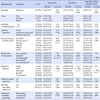Abstract
Purpose
The purpose of this study was to investigate factors affecting on infertility-related quality of life in women undergoing assisted reproductive techniques focusing on depression and resilience.
Methods
With correlational survey design, 125 infertile women who were receiving inpatient and outpatient treatment in K university hospital in D city completed a structured questionnaire.
Results
There was a significant negative correlation between depression and resilience and between the depression and the quality of life. There was a significant positive correlation between resilience and the quality of life. The factors affecting on infertility-related quality of life were depression, burden of expenses, and relationship with husband which explained 48% in the quality of life.
Figures and Tables
Table 1
Levels of Depression, Resilience and Infertility-related Quality of Life (N=125)

Table 2
Differences in Depression, Resilience and Infertility-related Quality of Life by Subjects' General Characteristics (N=125)

Table 3
Differences in Depression, Resilience and Infertility-related Quality of Life by Subjects' Disease-related Characteristics (N=125)

Summary Statement
▪ What is already known about this topic?
Infertility primarily affects emotional status negatively and reduces the fertility quality of life undergoing Assisted Reproductive Techniques.
▪ What this paper adds?
The factors affecting on the quality of life were depression, burden of expenses, and relationship with husband in the quality of life on infertile women.
▪ Implications for practice, education and/or policy
It is necessary for these women to develop and apply nursing programs consisting individual
counseling and education.
References
1. Boivin J, Takefman J, Braverman A. The fertility quality of life (FertiQoL) tool: Development and general psychometric properties. Fertil Steril. 2011; 96(2):409–415.e3.

2. World Health Statistics. Global health indicators: total fertility rate [Internet]. New-York: World Health Organization;2015. cited 2017 April 9. Available from: http://www.who.int/gho/publications/world_health_statistics/EN_WHS2015_Part2.pdf?ua=1.
3. National Health Insurance Service. Infertility women [Internet]. Wonju: National Health Insurance Service;2014. cited 2016 August 13. Available from http://www.nhis.or.kr/bbs7/boards/B0039/3031.
4. Kim SG, Kim YK, Kim HR, Park JS, Son CG, Choi YJ, et al. (The) 2012 National survey on fertility. Seoul: Family Health & Welfare;2012. p. 986.
5. Lee JH. The constitutional understanding of the low birthrate problem and approaches for its resolution. Korea Univ Law Rev. 2015; 79:85–128.
6. Ministry of Health & Welfare. Consultation with specialist about chilliness [Internet]. Sejong: Ministry of Health & Welfare;2015. cited 2016 August 20. Available from: http://www.mohw.go.kr/front_new/al/sal0301vw.jsp?PAR_MENU_ID=04&MENU_ID=0403&CONT_SEQ=323858&page=1.
7. Hwang NM. Factors related to the depression of infertile women. Health Soc Welf Rev. 2013; 33(3):161–187.
8. Lee JH. An analytical study on psychosocial predictors of depression and the effective psychosocial intervention program for reducing depression of infertile women being in infertility treatment [dissertation]. Seoul: Korea University;2013. 131.
9. Kim KR. The evaluation and prospect of infertile couple support policy: Focused on women's rights to child-birth and rights to health. J Reg Stud. 2012; 20(2):181–200.
10. Park CS. A study on the mental anguish of subfertility women. [master's thesis]. Seoul: Korea University;2013. 69.
11. Holka-Pokorska J, Jarema M, Wichniak A. Clinical determinants of mental disorders occurring during the infertility treatment. Psychiatr Pol. 2015; 49(5):965–982.

12. Kang EY. The study of psychosocial character of infertility women. Stud Child Fam Ther. 2014; 12:1–16.
13. Park MN, Choi SY. The effects of infertility stress and depression on quality of life in infertile couples. J Korean Data Anal Soc. 2012; 14(4):1987–2000.
14. Min SW, Kim YH, Cho YR. Stress, depression and factors influencing on quality of life of infertile women. J Korean Soc Matern Child Health. 2008; 11(3):19–32.
15. Bahrami N, Sattarzadeh N, Koochaksariie FR, Ghojazadeh M. Comparing depression and sexual satisfaction in fertile and infertile couples. J Reprod Infertil. 2007; 8(1):52–59.
16. Boivin J, Takefman JE. Stress level across stages of in vitro fertilization in subsequently pregnant and non-pregnant women. Fertil Steril. 1995; 64(4):802–810.

17. Cho YK, Hur K, Kim SH, Cha SH, Cho JH, Kim JY, et al. Obstetric outcome of unexplained infertility patients following assisted reproductive technology. Korean J Obstet Gynecol. 2004; 47(6):1179–1183.
18. Richardson GE. The metatheory of resilience and resiliency. J Clin Psychol. 2002; 58(3):307–321.

19. Im SB, O HY, Park YI, Lee EH, Lee S. Analytical review of resilience for preventive mental health nursing. J Korean Acad Psychiatr Ment Health Nurs. 2002; 11(3):304–315.
20. Koo YH, Na YJ. The infertility treatment related with polycystic ovary syndrome. Korean J Obstet Gynecol. 2010; 53(10):869–880.

21. Steer RA, Cavalieri TA, Leonard DM, Beck AT. Use of the Beck depression inventory for primary care to screen for major depression disorders. Gen Hosp Psychiatry. 1999; 21(2):106–111.

22. Wagnild GM, Young HM. Development and psychometric evaluation of the Resilience Scale. J Nurs Meas. 1993; 1(2):165–178.
23. Mick P. The World Health Organization quality of life assessment (WHOQOL): Position paper from the World Health Organization. Soc Sci Med. 1995; 41(10):1403–1409.
24. Kim MS, Lee IS, Lee CS. The validation study I of Korean BDIII: In female university students sample. Korean J Clin Psychol. 2007; 26(4):997–1014.
25. Song YS. Determinants of resilience of the physically disabled at home [master's thesis]. Busan: Kosin University;2004. 53.




 PDF
PDF ePub
ePub Citation
Citation Print
Print




 XML Download
XML Download